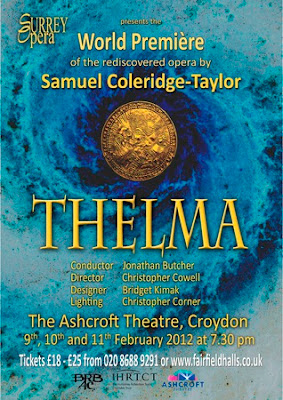[Samuel
Coleridge-Taylor]
SamuelColeridge-Taylor (1875-1912) is featured at AfriClassical.com. The
Samuel Taylor-Coleridge Foundation, www.sctf.org.uk
is deeply involved in the observance of this year's Centennial of
the composer's death. Sergio Mims of WHPK-FM in Chicago brings to
our attention an article in the February 2012 issue of Opera
Magazine
on Coleridge-Taylor's only opera, whose title is believed to have
been Thelma.
It
will presented on February 9, 10 and 11 at 7:30 p.m. by Surrey Opera
at The Ashcroft Theatre, Croydon.
Here
are brief excerpts from the article:
Opera
Magazine
February 2012
"MEETING
'THELMA'
Jonathan Butcher tells the story of
Coleridge-Taylor's 'lost' opera
Up until 1900, Samuel
Coleridge-Taylor (born in 1875) had had little to do with composing
for the theatre. His main body of work was choral and orchestral:
his most famous opus – the one that catapaulted him to fame more or
less overnight – was his major oratorio, Hiawatha's Wedding
Feast, to a poem by Longfellow
that Coleridge-Taylor had long admired. Sadly, although this was
performed all over the world (for two weeks every summer for a good
many years, at the Royal Albert Hall, alongside its companion pieces
The Death of Minnehaha and
Hiawatha's Departure), he
made little or no money out of the work, because he had sold it
outright to Novello – something he was bitterly to regret.
“It
was the great and revered actor and theatre manager Herbert Beerbohm
Tree who engaged Coleridge-Taylor to write incidental music for one
of his productions in 1900 – Herod, a
play by Stephen Phillips. This happy association was to continue
until Coleridge-Taylor's untimely death from pneumonia in 1912 at the
age of 37. As he became more and more interested in the theatre, the
Croydon-based composer was also to become more and more conscious of
his mixed-race heritage.”
“His
involvement with the theatre, with all its colourful characters,
magic and intrigue, may well have been the spark Coleridge-Taylor
needed to spur him on to write his only opera, as between 1907 and
1909 he was actively engaged in composing what we now believe he
would have called Thelma.
Had
he lived longer, he might well have changed the title to The
Amulet, an
early consideration, but that can only be speculation.”






No comments:
Post a Comment